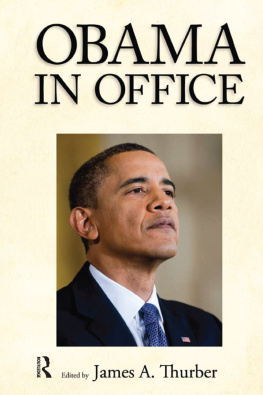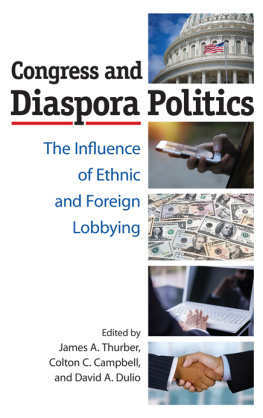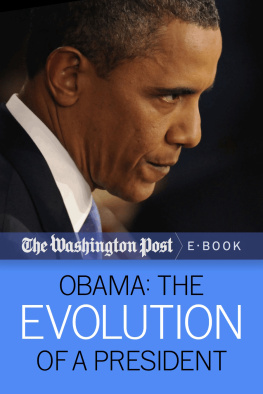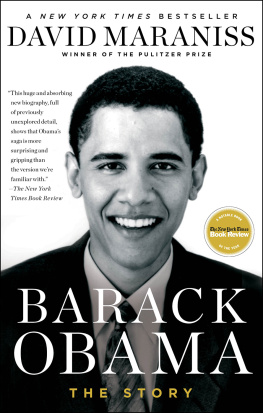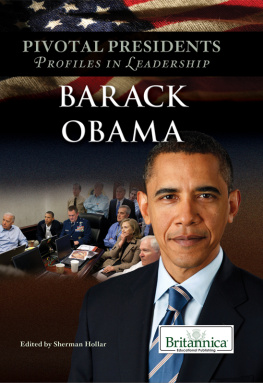OBAMA IN OFFICE
OBAMA IN OFFICE
Edited by
James A. Thurber
First published 2011 by Paradigm Publishers
Published 2016 by Routledge
2 Park Square, Milton Park, Abingdon, Oxon OX14 4RN
711 Third Avenue, New York, NY 10017, USA
Routledge is an imprint of the Taylor & Francis Group, an informa business
Copyright 2011, Taylor & Francis.
All rights reserved. No part of this book may be reprinted or reproduced or utilised in any form or by any electronic, mechanical, or other means, now known or hereafter invented, including photocopying and recording, or in any information storage or retrieval system, without permission in writing from the publishers.
Notice:
Product or corporate names may be trademarks or registered trademarks, and are used only for identification and explanation without intent to infringe.
Library of Congress Cataloging-in-Publication Data
Obama in office / edited by James A. Thurber.
p. cm.
Includes bibliographical references and index.
ISBN 978-1-59451-986-4 (hardcover : alk. paper) ISBN 978-1-59451-993-2 (pbk. : alk. paper)
1. Obama, Barack. 2. United StatesPolitics and government2009-. I. Thurber, James A., 1943-.
E908.O33 2011
973.932dc22
2011006599
Designed and Typeset by Straight Creek Bookmakers.
ISBN 13: 978-1-59451-986-4 (hbk)
ISBN 13: 978-1-59451-993-2 (pbk)
For my wife, Claudia
And my family,
Mark, Kathryn, Greg, Tristan, Bryan, and Kelsey
Contents
Chapter 1
An Introduction to an Assessment of the Obama Presidency
James A. Thurber
Chapter 2
Obama and the Polarized Public
Gary C. Jacobson
Chapter 3
Obama and the Public Mood
Richard W. Boyd
Chapter 4
Obamas Personality and Performance
Stephen J. Wayne
Chapter 5
Organizing the Obama White House
James P. Pfiffner
Chapter 6
Congressional Leadership in Obamas First Two Years
Barbara Sinclair
Chapter 7
A Post-Partisan President in a Partisan Context
John E. Owens
Chapter 8
Obamas Battle with Lobbyists
James A. Thurber
Chapter 9
Fall of the Favorite
Ron Elving
Chapter 10
Communication Is Destiny
Scott Lilly
Chapter 11
From Ambition to Desperation on the Budget
Joseph White
Chapter 12
The Politics of Regulation in the Obama Administration
Claudia Hartley Thurber, Esq.
Chapter 13
The Obama Administration and Internet Policy
Douglas E. Van Houweling
Chapter 14
Structural Challenges for American Foreign Policy in the Obama Administration
Jonathan Wilkenfeld
Chapter 15
The Obama Administration and Counterterrorism
Martha Crenshaw
Chapter 16
Obamas Use of Prerogative Powers in the War on Terrorism
Richard M. Pious
Chapter 17
Reclaiming and Rebuilding American Power
Lawrence J. Korb and Alexander H. Rothman
Posting a solid victory in the 2012 presidential election, President Barack Obama emerged to confront a divided Congress and new and continuing challenges, including the fiscal cliff, new school shooting tragedies, and rocky foreign affairs. He moved quickly to consolidate political capital, nominate replacement cabinet members, and offer new policy initiatives in areas unaddressed during the first four years of his presidency. The deep partisan divide in Congress that plagued Obamas first term persisted into the second, but he seemed determined to press opponents harder and return to issues and commitments on which he had campaigned in both 2008 and 2012. The Affordable Care Act that had dominated the policy agenda of the first term was now primed for implementation. Immigration reform, gun control, tax and entitlement reform, and a renewed spirit in the Middle East and Afghanistan dawned with the new administration. Even though the 2010 midterm elections had institutionalized an era of bitterly divided government, it was not too soon to begin to look forward hopefully to 2014. But to return to where this story started, in January 2010, just one year into the Obama administration, Dr. Nada Mourtada-Sabbah, AUS Vice Chancellor for Development and Alumni Affairs and Professor of International Studies at American University of Sharjah (AUS), asked that I assist her in the organization of a convocation of academics, journalists, and practitioners in their respective fields of expertise to give an objective and balanced evaluation of Obamas policies and performance since taking office. That conference led to an ongoing discussion and research, which eventually became the beginning of this book. The research and book took on a life beyond the conference as the Obama administration progressed and authors and topics were added, but this book would not have been written without the support of Dr. Mourtada-Sabbah and the American University of Sharjah. I want to thank AUS for sponsoring and hosting this conference in early 2009. Individually, I want to thank His Highness Sheikh Dr. Sultan Bin Mohammed Al Qassimi, United Arab Emirates Supreme Council Member, Ruler of Sharjah, and President of the American University of Sharjah, under whose aegis the conference was held; AUS Trustee Riad T. Sadik, Chairman of Al Habtoor Leighton Group who, along with the American University of Sharjah, generously co-sponsored and supported the conference; Dr. Peter Heath, Chancellor of AUS, who took time in his busy schedule to attend the various panels of this conference and endorsed it from its inception; and the Center for Congressional and Presidential Studies (CCPS) in the School of Public Affairs at American University for continuing support of the research for this book. Dr. Nada Mourtada-Sabbah deserves special thanks for her creative idea for the conference and for her long-term collaboration with CCPS. I am grateful to Jennifer Knerr, Vice President and Executive Editor and Director of College Publishing at Paradigm Publishers, for her support of this project, creativity, and timely but careful editing. This is the third time I have had a book published with Jennifer. Each time gets better. I want to thank several individuals at Paradigm Publishers for their enthusiasm and editorial and marketing support for this book: Terra A. Dunham, Publishing Associate, College Marketing and Acquisitions; Laura Esterman, Senior Project Editor; and Pete Hammond, Director of Sales and Marketing. I thank Paradigm Publishers for its support of this volume.
I also want to thank my colleagues and staff at the Center for Congressional and Presidential Studies at American University who provided assistance at various stages of this project, especially Rebecca Prosky, Matt Grieg, Laura Uttley, Sarah Heidt, and Aaron Zimmerman. Special thanks go to Dr. Patrick Griffin, whose years of experience in the White House, on the Hill, and as a lobbyist, AU professor, and CCPSs Assistant Director for Programs and Policy Analysis brings new insights, wisdom, and knowledge that help my research and writing about American politics. Thanks to my students at American University, many of whom have worked in the White House, on the Hill, in campaigns, and for interest groups, for their questions, creative ideas, and inspiration. I have been blessed to have such consistently great students for so many years at American University. I owe a special thanks to William LeoGrande, dean of the School of Public Affairs at American University, for the long-term support of the Center for Congressional and Presidential Studies. Neil Kerwin, President of American University has been a close friend and colleague and a strong supporter of CCPSs mission of bringing together the best academic research and applied knowledge about politics and government, which is a central approach of this book.

